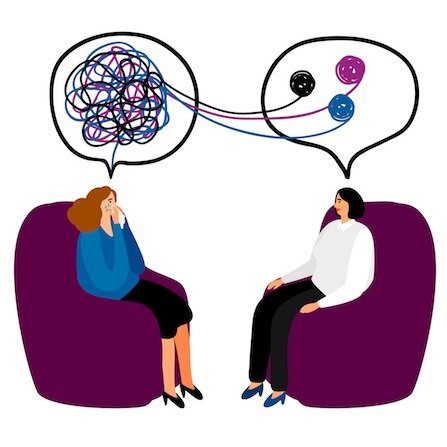
Everyone can benefit from therapy
We often think of seeing a therapist or counselor as something only for people who have super serious mental health concerns. However, therapy is extremely beneficial for everyone! If you are going through something more acute like a breakup or family issues or relationship problems, therapy can help you process your feelings and equip you to have a positive response to negative situations.

Girl Scouts Mental Health Awareness Patch
The International Bipolar Foundation offers a mental health awareness patch to all scouting organizations including the Girl Scouts, Girl Guides, and others.

Yoga for Healing: Trauma-informed yoga
Everyone does yoga for different reasons - exercise, flexibility, meditation, posture, community, etc. But yoga can also be useful for your mental health, especially if you've experienced trauma or have other mental health concerns.

Out of the Darkness Community Walk
Please join me in attending the Out of the Darkness community walk sponsored by the American Foundation for Suicide Prevention. Their goal is to reduce the annual suicide rate 20% by 2025. Money donated to the AFSP goes toward research, advocacy, and support for those affected by suicide.

Mental Health First Aid
I posted about Mental Health First Aid in general during #shawleveryday2019, but today Brian and I were able to attend the course for ourselves. While I did know a lot of things already, I felt that it was very valuable and is a great addition to my toolbox.
Gratitude
When you're having a rough day, it can be easy to stay focused on the negative. It can be easy to get stuck in the cycle of thinking that everything is bad and everything will always be bad. One suggestion that my therapist made, which I know sounds super cheesy, is to keep a gratitude journal.

Mental health day
You can often tell when you're coming down with something. The runny nose is easy enough to deal with, but then you also get congestion, then you start developing a cough. And at some point, you know you need to take some time to rest and heal. So, you take a sick day and watch some Netflix on the couch and then you are able to get back to full speed the next day.
Resilience
Psychological resilience is the process of adapting well in the face of adversity, trauma, tragedy, threats or significant sources of stress. It can be seen as the ability to "bounce back" after difficult experiences. Some people are more resilient than others, but it is a skill that takes practice. It is something that you can improve, which can help improve your life overall.

Sunny Blossom Brand
Today I want to give a shoutout to Sunny Blossom Brand, which is a new apparel company designed to spread mental health awareness, fight the stigma, and encourage positive self-growth and love.
Fixation on the negative
A common type of distorted thinking that people experience is the fixation on the negative things that happen. There could be a day full of positive experiences, but if a tiny negative experience happens, our brains can get fixated on it and it washes out all the positive things.
Barriers to mental health care
I know I mention all the time that it's important to get help when/if you need it. But it's not always as simple as that. There are often a number of barriers to getting the help that you need.

5 minute self-care
It has been a really crazy weekend, so I want to make sure everyone is taking time for self-care. It only takes 5 minutes, so if you can watch a YouTube video, you can do self-care.
Parenting a teen with mental health concerns
I am not a parent, so a lot of times I don't feel qualified to talk about parenting concerns. I don't know what you're going through and I don't know what's right for your family. But I do know a lot about mental health in general and I hope that I can provide some resources if you don't know where to start.

Being alone with your thoughts
I had been working on this puzzle in earnest for the last month or so. There's not much to go on for each piece, so it was mostly a brute force effort. I'm not one to listen to music while working, so I was pretty much just along with my own thoughts while I ran through all the possible pieces.
Where should we spend money for mental health?
Mental health is an area, like many others, which does not get a lot of money, whether through grants or government budget or donations. There are a lot of ways to spend that money, but it's critical that it gets spent efficiently. What aspect of mental health spending do you think are the most important and what do you think isn't a good value? Is there an area of spending that I haven't thought of? Let me know!
Lack of biological markers for mental health concerns
Mental health diagnosis and treatment is often difficult because there are no or very few biological tests that doctors can conduct, instead relying on the person's own experiences, thoughts, and assessment. When doctors do run tests, it is often to rule out physical disorders such as Vitamin D deficiency, prion disease, or a thyroid disorder. There are tests that measure serotonin levels in your blood, but those levels are not necessarily correlated with the levels in your brain.

The Perspective Project
Today I want to give a shout out to The Perspective Project, which is a charity ending the stigma around mental health through creativity and open expression. They provide a therapeutic outlet for those suffering from mental health conditions, whilst shedding light on mental health to the wider public.
Medicine takes time to work
Medication for a mental illness is definitely not some sort of "quick fix." It's not like you just take some pills and things get better immediately. Mental health medication takes time to work and the first one you take may not even be the right one for you.
Medication does not mean you are weak
Mental health conversations have come a long way. People are more and more willing to talk about what is going on in their life and if they are struggling. People are able to get help. So, it surprises me when I still hear some people talk about a fear of taking medication.
Suicide prevention and crisis lifelines
You may already know the main National Suicide Prevention Lifeline number (1-800-273-8255), but did you know there are few specific crisis phone numbers?
